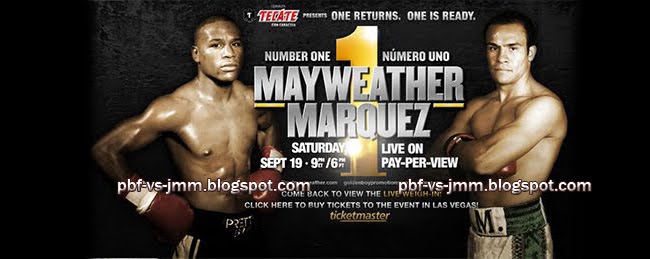LAS VEGAS – I listened to Juan Manuel Marquez on Tuesday afternoon try to explain the nutritional benefits of drinking a glass of his own urine two times a day.
I listened to another guy talking about how throwing boulders while climbing a mountain near Mexico City would convert Marquez into a welterweight.
Marquez’s highly regarded trainer, Nacho Beristain, will give you a bewildering assortment of measurements he’s made that have convinced him that Marquez is ready to leap from the lightweight division and its 135-pound weight limit to welterweight to face Floyd Mayweather Jr. on Saturday in an HBO pay-per-view bout at the MGM Grand Garden Arena.
Me, I’m not so sure Marquez is a welterweight. I know he’s a phenomenal featherweight and a superb super featherweight and a pretty solid lightweight. As to Marquez’s insistence that he’s big enough to hand Mayweather his first defeat in 40 professional fights, well, I’m just not so sure I’m buying that.
It sounds like a lot of hocus pocus.
Drinking pee is not for me and, as far as I know, Marquez isn’t going to be able to hit Mayweather with any of those boulders he was tossing on that mountain.
I came up with my own test to determine whether Marquez is really going to be a welterweight when he steps into the ring on Saturday or whether he’s just a lightweight who’s packed on a few pounds to look good with his shirt off.
I used the simple eye test.
I looked at Marquez and he hardly looked like a welterweight to me. This is a guy who, almost exactly 10 years ago to the day, fought in a championship bout on the same card as Mayweather at a casino in Las Vegas.
On Sept. 11, 1999, Marquez lost a 12-round decision to Freddie Norwood at the Mandalay Bay in a fight for the World Boxing Association featherweight title. In the main event on that show, Mayweather retained his World Boxing Council super featherweight belt by thrashing Carlos Gerena.
From the day he turned pro in 1993 until the end of 2006, Marquez was a featherweight. He moved up to super featherweight in 2007 for the opportunity to make a big payday against fading Marco Antonio Barrera. He fought there twice more and then, a year ago, with no prospects of a third fight with Manny Pacquiao, he moved to lightweight to take on another fading veteran, Joel Casamayor.
He won the belt that night with a typically efficient performance, then he defended it in February against Juan Diaz.
Now, here he is preparing to fight as a welterweight for the first time in his career.
About 45 minutes before Marquez sauntered into the MGM Grand Garden on Saturday, I stood immediately to Mayweather’s left. When Marquez walked into the room, the difference was stark.
Marquez wasn’t as broad at the shoulders or as big in the arms or as thick throughout his body.
My eyes told me the story: Mayweather is a welterweight; Marquez is a make-believe one.
Now, I’d rather have a talented, gifted smaller man on my side than a heavier, less-skilled man.
And I’m the first to admit, I’ve been far from perfect at understanding the impact when a fighter moves up in weight. I was convinced Oscar De La Hoya was far too big for Pacquiao when they fought last year.
I thought that while Pacquiao might, indeed, be the more gifted fighter, De La Hoya was so much bigger and stronger that those advantages would overcome whatever edges in skill Pacquiao possessed.
Well, we know how that one turned out. Pacquiao put on the performance of his life, and De La Hoya looked like he didn’t belong in the ring. Pacquiao stopped him in the eighth round.
On Tuesday, De La Hoya was trying to make the case for Marquez against Mayweather. I asked him about his fight with Pacquiao and whether the outcome was the result of Pacquiao being so good, him being at the end of the line or a combination of those and/or other factors.
“Pacquiao is good, there’s no doubt about it,” De La Hoya said. “And he’s fast. I thought there were 10 of him in there. I’m looking here and he’s over there. And I’m reacting to a punch from this way and there’s another coming at me from that way.
“Truthfully, he didn’t hit hard. He didn’t really hurt me. But the punches were so fast and they were coming from everywhere, it felt like there were 10 of him, seriously.”
Marquez talked Tuesday about his work to improve his speed. He insisted that by the end of his training camp, he had improved his speed considerably and was convinced he was as fast as Mayweather.
Basically what we have here is a guy who has to add pounds to his body to make the weight and who has to drill to try to add the speed.
It’s happened in this decade. Shane Mosley jumped from lightweight to welterweight in 2000 and defeated De La Hoya. Roy Jones moved from light heavyweight to heavyweight in 2003 and bested John Ruiz.
And Pacquiao went from lightweight to welterweight last year to beat De La Hoya.
So there is precedent for a smaller guy moving up and being successful.
But in each case – Mosley, Jones and Pacquiao – the guy moving up was decidedly faster.
On Saturday, the bigger man will be Floyd Mayweather.
On Saturday, the faster man will be Floyd Mayweather.
On Saturday, the stronger man will be Floyd Mayweather.
That doesn’t guarantee him a win, but it’s a hell of a start.
Methinks Marquez is going to find that hitting Mayweather is a lot tougher than throwing a boulder up a mountain.
Source: sports.yahoo.com
Wednesday, September 16, 2009
Subscribe to:
Post Comments (Atom)





No comments:
Post a Comment